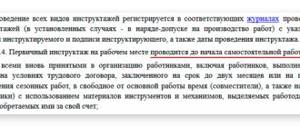Last modified: January 2021
On-the-job training is one of the components of the personnel training system. What it is? When is it used? How to apply for an internship?
The Labor Code provides general guidance on when on-the-job training applies. There is no separate law on internships at the federal level. The Labor Code specifically defines on-the-job training in labor protection (Articles 212, 214, 225 of the Labor Code of the Russian Federation). GOST 12.0.004-2015 contains regulations for training in occupational safety in the workplace. Article 59 of the Labor Code of the Russian Federation mentions that a fixed-term contract is signed with a person applying for an internship, for vocational training or additional vocational education in the form of an internship.
What is the internship for?
The main point of an internship is that an employee learns directly in the process of his production activities. This period, when both study and activity occur simultaneously, helps the employee to practically master work skills in new conditions.
Question: Is it necessary to conduct an internship for electrical engineering personnel to develop individual internship programs (for each employee) depending on the level of professional education, work experience and profession (position) of the trainee, or is it sufficient to develop standard internship programs for each position (workplace) and approve them in the prescribed manner? View answer
Most often, the need for an internship is obvious in the following situations.
- First job. Yesterday's student received theoretical training in his specialty, but he certainly lacks practical skills due to lack of experience. Under the guidance of an experienced mentor in real working conditions, practical training will take place quickly and effectively.
- Harmful and dangerous conditions. If a person starts working under such working conditions, then he needs a period of supervision by experienced supervisors who will help him orient himself and avoid possible cases of work-related injuries and harm to health.
- Change of workplace . If a person did not change employer, but only a position, for example, moved to another department, received other responsibilities, or even went for a promotion, he will need time to understand the new working conditions. An internship will provide this opportunity.
NOTE! An internship is necessary in any situation when a person starts a new job, regardless of his experience and theoretical training.
Document for a newly hired employee
The order is drawn up by the director of the organization or those people who are responsible for ensuring that the new employee is instructed. Based on their order, an order for assignment to an internship is formed (the sample was above in the photo), which is signed by all parties involved. Their signatures will mean that everyone is familiar with what is stated in this document.
Features of drawing up an order
Order of the Ministry of Transport No. 59: driver training
When drawing up an order, you need to ensure that its plan and content meet the standards. The order for an internship must contain a header, body and conclusion. The first section should contain information about the organization with the date of its formation and name.
The second section must specify the reasons for completing the internship. The final clause must contain information about the director and employee along with their signatures.
For your information! There may be attachments to the order.
For harmful and dangerous
Internships for hazardous and hazardous enterprises are mandatory under existing Russian legislation. There is no sample order for internship at the workplace as such. It is compiled according to a standard example.
How to indicate the period of the procedure in the order
The period is determined in accordance with the length of service, profession and level of education. The maximum is 14 work shifts according to GOST from 2015. In the order, this information is written that the trainee was trained for such and such a time and was informed about such and such.
Note! The order for an internship can be changed throughout its entire validity period. To do this, you need to issue a special order from the director. However, it is not advisable to do this, since a lot of paperwork will need to be corrected. It's easier to create a new document by canceling the current one.
What does the law say about internships?
The provisions on employee internships are enshrined in the Labor Code of the Russian Federation and related documents. The regulations set out the regulations for internships, as well as the categories of employees for whom this process is mandatory, including the responsibility of the employer. The internship procedure is defined in the following legislative acts:
- Art. 212 of the Labor Code of the Russian Federation;
- Resolution No. 1-29 of the Ministry of Education of January 13, 2003;
- Order No. 37 of Rostechnadzor dated January 29, 2007;
- GOST 12.0.004-90 clause 7.2.4;
- Letter RD-200-RSFSR-12-0071-86-12.
How to arrange occupational safety training in the form of an internship ?
Positive aspects of the internship for both parties
IMPORTANT! A sample workplace internship program from ConsultantPlus is available here
Practical activities under the guidance of a more experienced specialist are of great benefit to both sides of the labor process. Thanks to the internship, the employee :
- acquires or improves practical work skills in his specialty;
- can evaluate himself in the context of new working conditions;
- clarifies the range of his immediate responsibilities and requirements for them;
- joins the team, begins to build relationships with colleagues, superiors or subordinates;
- gently adapts to new working conditions, schedule, workplace, routine requirements and discipline.
Advantages of an internship for an employer :
- compliance with legislation regarding requirements for creating safe working conditions;
- increasing employee efficiency by reinforcing theoretical training with practical skills;
- increasing the level of training and qualifications of employees, and therefore their productivity;
- reducing the risk of harm to health at work;
- direct acquaintance with the employee’s work style, development of management strategy.
ATTENTION! The only negative aspect of an internship can be its incorrect organization, when the employee’s rights are violated or the process is carried out with violations, and therefore ineffective.
On-the-job training program for all blue-collar occupations
The internship program is subject to local regulations for the organization. It is developed by the head of a structural unit with the participation of the labor protection department. Thus, if we are talking about an internship, for example, for electrical engineering personnel, the chief engineer’s service will draw up a training plan.
Next, the internship plan is agreed upon with the trade union (or other elected body of workers, if there is one at the enterprise) and approved by the employer. The approval procedure is established in Article 372 of the Labor Code of the Russian Federation.
There is no standardized model for a workplace internship program. It is drawn up according to the rules of office work that are adopted in a particular organization. It is important that at the beginning of the document all necessary approval visas are indicated: by the head of the organization and the trade union (if there is one). The approval date, the date of the trade union committee meeting and the protocol number are indicated.
The program begins with an explanatory note, which lists all the supporting documents and the duration of the internship. It is important that both professional standards and the manufacturer’s operational documentation for the equipment used are used.
Try for free, refresher course
Documentation support for work with personnel
- Meets the requirements of the professional standard “Human Resources Management Specialist”
- For passing - a certificate of advanced training
- Educational materials are presented in the format of visual notes with video lectures by experts
- Ready-made document templates are available that you can
Next comes the general part. It indicates the training objectives, the exact name of the production processes, and the requirements for the trainee. The skills that the employee must master are listed, and the outcome of the internship is indicated - passing the test for admission to independent work.
After this, the immediate training plan is described. Traditionally, it is compiled in the form of a table, noting opposite each topic the number of hours or shifts required to master it. It is advisable to include the maximum number of hours in the internship program for blue-collar professions, and adjust the training time based on the qualifications of a particular employee. The mode and pace of training remain in the competence of the teacher-mentor.
For whom an internship is inevitable?
The law talks about mandatory internships for certain categories of people just starting work. These include:
- Young professionals;
- employees who came to work in harmful and/or dangerous conditions;
- operators of technological and/or industrial installations;
- drivers of public transport (minibuses, trolleybuses, trams, buses).
IMPORTANT! For other categories of employees, the internship must be carried out in accordance with Part 2 of Art. 212 of the Labor Code of the Russian Federation, which speaks of the need for the employer to provide training in safe labor practices and organize workplace safety briefings and internships. Many employers believe that in other cases an internship is not required, although this is not the case. The law only allows for a reduction in training time.
Occupational Safety and Health
ORDER
No. 04 Moscow
“On internship and training of a newly hired employee”
In accordance with Art. 213, 225 of the Labor Code of the Russian Federation, Art. 18, 14 of the Federal Law “On the Fundamentals of Occupational Safety and Health in the Russian Federation”, GOST 12.0.004-90 “Organizations of safety training. General provisions”, Resolution of the Ministry of Labor and Ministry of Education of the Russian Federation No. 1/29 of January 13, 2003 “On the procedure for training in labor protection and testing knowledge of labor protection requirements for employees of the organization”
I ORDER:
1. During the period from ____ to ____ (specialty, profession, full name of the employee), as a newly hired employee, conduct an internship and training according to established programs, followed by testing of theoretical and practical knowledge and skills by the relevant commission of the organization.
2. Appoint the person responsible for the employee’s training and internship (position, full name of the employee’s immediate supervisor)
3. If the results of the inspection are positive (position, full name of the employee’s supervisor), prepare a draft order for the employee’s permission to work.
4. When conducting an internship, be guided by the regulations on the internship (appendix to the order)
Director
Executed by Kovalev Tf. 22-33-44
Appendix to order No. 04
REGULATIONS on the procedure for bringing an internship to OJSC ________
1. The purpose of the internship is to consider the practical development of work skills acquired during professional training, as well as the development of safe work practices by employees at a specific workplace.
2. The internship must be completed by: - all newly hired and transferred to another job (position, workplace) workers in blue-collar professions and specialists engaged in work that is subject to additional (increased) labor safety requirements; — graduates of higher and secondary specialized educational institutions, vocational schools, workers who graduated from educational (training and production) centers.
3. Heads of production units, in agreement with a labor protection specialist, may exempt from internship an employee who has worked in his specialty for at least three years and is transferred from one production unit to another, if the nature of his work and the type of equipment on which he previously worked are not is changing. In this case, the entry “Without internship” is made in the Occupational Safety Instruction Logbook at the workplace and the order number (instruction) on the corresponding exemption is noted.
4. During the internship, the employee must perform work under the supervision (supervision) of an experienced employee (hereinafter referred to as the internship supervisor).
5. Internships for workers in blue-collar professions can be supervised by foremen, foremen, instructors and other qualified workers who have at least three years of practical work experience in the given profession, and internships for specialists can be supervised by specialists of higher qualifications and with at least three years of practical work experience or heads of production departments . No more than two people can be assigned to one internship supervisor.
6. The supervisors of the internship for blue-collar workers are determined by the head of the production unit, and the supervisors of the internship of specialists are determined by the head of the division of OJSC “_”. The appointment of an internship supervisor is formalized by an appropriate order (instruction). The internship supervisor and the employee must be familiarized with the order (instruction) against signature.
7. The duration of the internship is determined from 2 to 14 shifts (working days), the specific number of shifts is established by the head of the production unit depending on the nature of the work and qualifications of the employee, unless other terms are established by the relevant rules approved by state supervision and control bodies.
8. The internship is carried out according to the approved Initial Instruction Programs at the workplace after the initial instruction at the workplace.
9. The internship supervisor must make an appropriate entry in the on-the-job training logbook.
10. Responsibility for the quality of the organization and conduct of the internship lies directly with the heads of the structural units where the intern works.
11. If the instructions (orders) of the trainee are violated, the number of internship shifts may be increased. The fact of a violation must be recorded in a report addressed to the immediate head of the unit and to the labor protection service.
12. The quality of the internship with the employee is checked before the expiration of a month from the moment the employee is hired by oral questioning or testing and checking the practical skills of the work performed in accordance with the existing qualifications.
Brief description of order 04
The order in a certain sense complements order No. 03. Their special difference is that in order No. 03 all employees (subject to training and inspection) are trained and tested en masse once a year, and in the same order a specific employee is determined.
There is one feature that you should pay special attention to. Thus, in column 11 of the workplace briefing logbook, it is necessary to determine the number (from 2 to 14) of work shifts during the internship, but even the maximum number of shifts does not actually give the right to allow the employee to work independently, since he has not been trained in occupational safety issues and the corresponding check. Therefore, it is recommended that the order specify 30 days for internship, training and subsequent testing of knowledge and acquired skills, which is quite enough even for an employee with a low level of general education and an insufficient primary level of practical skills.
Features of the program
The internship program is individual for each category of employee, position, specialty, and qualification. It is developed by the internship supervisor (mentor appointed by order) and approved by superiors. The content of the program necessarily includes the following items:
- the purpose of the internship;
- requirements for the trainee;
- the names of the documentation that he must study;
- the duties that the intern will perform, his job description;
- a set of training activities: familiarization with the workplace, the territory of the organization, study of work processes (according to competencies), etc.;
- ensuring the acquisition of practical skills (taking into account labor protection);
- test based on the results of the internship.
Each stage should have a specific time planned (in hours or shifts), which can be adjusted if necessary.
Payment for the training period
Let us turn again to the definition: “Internship is a work activity...”. And as you know, any work must be paid.
Even if, after working for several days, your employer refuses further employment, you are required to pay for the days you worked. If you are refused payment, you have the right to go to court.
In this case, the trainee’s salary cannot be less than the established minimum wage. As of January 1, 2021, the minimum wage was 11,280 rubles per month. Payment for additional practice must be made officially, taking into account all tax deductions.
However, the salary during the probationary period is always less than the standard salary of an employee in the same position.
But let's get back to the students. As mentioned earlier, educational activities are not an internship for the purpose of employment on a permanent basis, it is intended for the trainee to gain experience, and therefore is not paid.
Internship procedure
- Conclusion of an employment contract: fixed-term with a student intern, regular with an internship clause for a transferred or newly hired employee.
- Conducting initial briefing on occupational safety and health (with recording of its completion in the appropriate journal).
- Appointment of a mentor-supervisor: an experienced employee who observes and provides training in practical skills.
- The internship itself is work under the supervision and guidance of a mentor.
- Test based on the results of the internship: performance testing can be in the form of an exam, test, survey, performance assessment, or other, provided for by the internal Regulations on the internship and its program for a specific position.
- Admission to permanent independent work on a general basis, issuance of an internship certificate.
In what cases is an internship necessary?
Completing an internship is not always a prerequisite for employment or appointment to a particular position.
However, in some situations it is necessary:
- when a person first gets a job (especially for various types of industries);
- when transferred to another position within the company if the working conditions there are considered dangerous or harmful;
- when transferred to other structural units of the organization;
- upon promotion.
It should be noted that an internship should not be confused with instruction, which provides only theoretical knowledge, or a probationary period, during which the employee already performs his official duties in practice.
Moreover, any internship must be formalized in accordance with current labor legislation and be subject to mandatory payment.
Internship pitfalls
The most difficult aspect for interns who do not fully know their rights is that an unscrupulous employer may try to take advantage of their free labor by not paying them for the internship period and firing them at the end of it.
The Labor Code of the Russian Federation clearly states that the internship period must be fully paid; moreover, mentoring activities are also subject to additional payment.
You can appeal this situation to the labor dispute commission, trade union organization, or contact government agencies, for example, the labor inspectorate.
What about paying for internships?
How are internships paid?
When applying for an internship, it is important to ensure that relationships with subordinates are formalized using one of the following types of contracts:
- open-ended employment contract;
- fixed-term employment type of agreements;
- civil law (for example, it is allowed to draw up a contract).
The document must separately specify the terms and conditions associated with payment. The latter must be present in any case at least in a minimal amount. The only exception to the rule is students who are sent to work by the educational institution.








